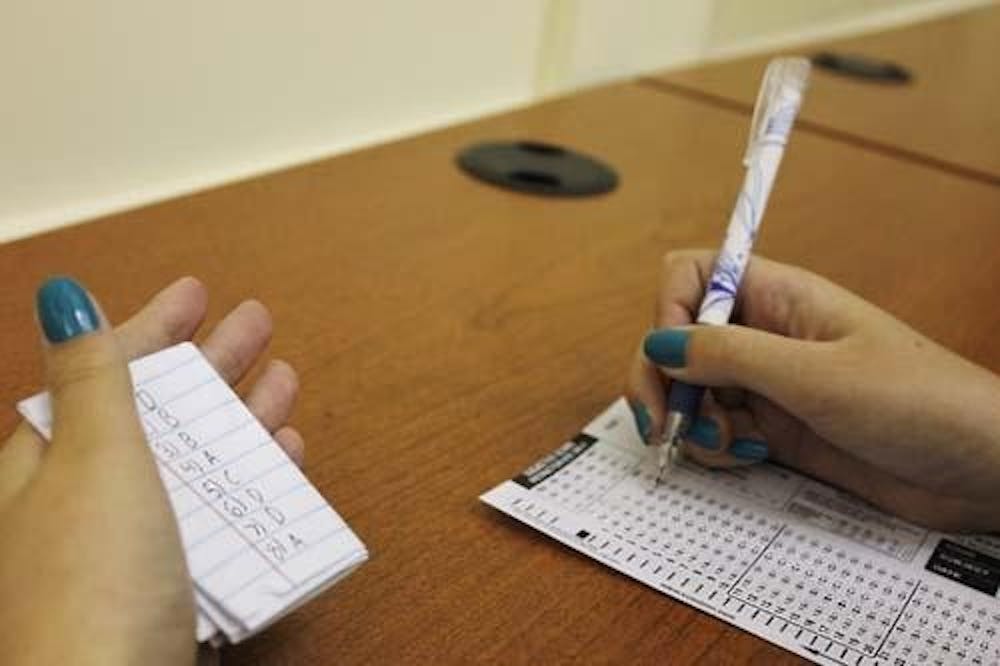After 125 Ivy League students are suspected of cheating on an exam, UP weighs in on academic integrity
After 125 Harvard University students allegedly cheated on a final exam, the subject of cheating in college is being discussed nationally. UP has a four part policy about academic integrity that ultimately could lead to the revoking of a student’s degree if caught cheating. (Photo Illustration | The Beacon)
By Kate Stringer, Staff Writer stringer14@up.edu
There's too much social networking going on at Harvard, and this time it's not a Mark Zuckerberg creation.
Two weeks ago, Harvard announced that approximately 125 students in its "Intro to Congress" class are being investigated for allegedly cheating on an exam last spring.
Investigations began when similarities were noticed among half the class's exams. However, because the test was administered as a take-home, many students argue that the rules of collaboration were unclear.
When it comes to academic integrity policies at University of Portland, students believe the rules are straight-forward.
"You're blatantly informed about cheating rules," junior Alex Miller said. "We're pounded over the head with cheating syllabi."
That isn't to say cheating doesn't exist at UP.
Carol Craig, associate dean for the nursing undergraduate program, sometimes has to handle issues involving academic integrity.
"Occasionally I do have a student come to me and say 'I know there was cheating on an exam,'" Craig said. "Occasionally someone will be caught blatantly cheating on an exam and usually that person will tell me 'I was just overwhelmed, it was a stupid thing to do. What can I do to make up for that?'"
Spotting cheating is a learned art. Education professor Eric Anctil said it's important to take into account students' abilities.
"In the case of one of the students I remember at community college, she just wasn't bright enough to have written what she wrote," Anctil said. "There's a mismatch in product and what you feel is the student's ability in other areas."
The Internet is a double-edged sword when it comes to cheating. While it might provide students with resources to plagiarize, it also provides professors with the means to catch them.
"All you do is cut and paste a signature line into Google and bam! There it is," Anctil said. "I'm just like - you stole the whole thing from Google! What were you thinking?"
Consequences for academic integrity infringements are spelled out in UP's bulletin. There are four levels of violation, each with consequences ranging from community service to revoking an awarded degree.
Though the code is clear, many UP students believe cheating has more to do with time management.
"I think students make that leap when they come to a deadline," sophomore Megan Richardson said. "Often they're the people who procrastinate."
In the case of the 125 Harvard students, sophomore Francis O'Halloran speculates about their motivation to risk academic integrity.
"They've been brought up with the pressure of getting straight A's so they want to conform," O'Halloran said. "They're scared."
While Craig understands the various factors that influence student cheating, she also points out that there are larger things at stake than a GPA when a student decides to cut corners.
"No one stands over your shoulder [after college] to know that you've done this correctly or lived up to those standards of integrity," Craig said. "So we try to make it very clear to the students that academic integrity is a part of that. The standards have to be internal and not external."
Junior Jessica Parga believes the issue of cheating is also bigger than the GPA.
"Morally, it's wrong," Parga said. "It's your integrity on the line."
Anctil points out that as technology advances, students get mixed messages regarding collaboration versus individual work.
"It used to be if you were in your house late at night and there was nothing on television you were just kind of bored. But now you can text with people, you can be on the computer, you can be part of this social network of things that are going on all the time," Anctil said. "I think what we're seeing is that [increase in technology] spilling out into academic expectations, too."
However, the education system demands individualized thinking and testing.
"One thing that education might need to do is figure out ways of creating more group projects and assignments so we can teach people to be fair collaborators when they create things," Anctil said.
For students who feel pressured to achieve academically through cheating, Craig recommends talking to professors.
"I think sometimes students don't recognize that our goal is exactly the same as their goal, and that's that they succeed and go out into the world as one of our graduates," Craig said. "But we want to see them succeed in the right way."








